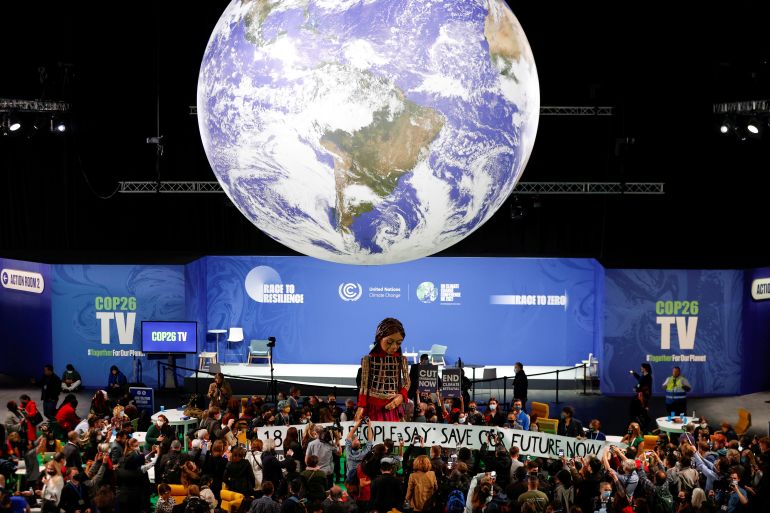COP26 draft text calls for tougher emissions pledges by 2022
Negotiators from nearly 200 countries will work from the draft to strike a final deal before the summit ends on Friday.

The United Nations climate agency has published a first draft (PDF) of the political decision countries will likely issue at the end of the COP26 summit being held in the Scottish city of Glasgow.
Negotiators from nearly 200 countries will work from the draft released on Wednesday to strike a final deal before the summit ends on Friday.
Keep reading
list of 4 itemsHot air: Scepticism over Indonesia’s COP26 deforestation pledges
COP26: Obama criticises China and Russia for ‘lack of urgency’
Messages to COP26 from a generation on fire
The first draft of the “COP cover decision” asks countries to “revisit and strengthen the 2030 targets in their nationally determined contributions, as necessary to align with the Paris Agreement temperature goal by the end of 2022.”
The Paris Agreement, adopted in 2015, set the goal of holding the increase in the global average temperature to well below 2 °C above pre-industrial levels, pursuing efforts to limit the temperature increase to 1.5 °C.
For the first time, the draft calls for countries to phase out coal and fossil fuel subsidies.
It also calls for a “just transitions to net zero emissions” and emphasised the importance of of scaled-up financial resources, taking into account the needs of developing countries vulnerable to the adverse effects of climate change.
The outcome is being closely watched for what it might commit countries to do to bridge the gap between their current climate targets and the more ambitious action scientists say is needed to avert disastrous levels of warming.
Insufficient pledges
Observers have welcomed the commitment to phase out coal but questioned whether the pledges had gone far enough.
The head of Oxfam’s COP26 delegation, Tracy Carty, said the draft decision was “too weak.”
“It fails to include clear and unambiguous commitment to increase the ambition of 2030 emission reduction targets next year to keep 1.5 degrees alive. Emissions are rising, not falling and current commitments are way off track for keeping this goal within reach,” Carty said in a statement.
Yamide Dagnet, climate negotiations director at the World Resources Institute, raised concerns over the financial aid allocated to developing countries.
“We’ve seen some progress but I don’t think it’s going to meet the standards that the third world countries expect,” Dagnet told Al Jazeera.
Eddy Perez, international climate diplomacy manager with Climate Action Network Canada, said the text is “extremely problematic” as “it does not address the need to scale up adaptation finance [for developing nations]”.
Climate activist Jennifer Morgan said the commitment to phase out fossil fuels was likely to be challenged by hydrocarbon-rich nations such as Saudi Arabia as negotiations heat up over the next few days.
Morgan also slammed the draft decision, saying “this is not a plan to solve the climate emergency.”
“Vulnerable countries are fighting for their lives and developed countries need to listen to that,” she said.
Big divisions remain
Big divisions remain as countries barter over the fine details. Among them are disagreements over carbon market rules, the timeline for updating emissions-cutting pledges and payments to climate-vulnerable nations.
Al Jazeera’s Andrew Simmons, reporting from Glasgow, said “people are rolling up their sleeves here” as pressure mounts.
“There is a lot of tension because of series of issues, specifically what is known as the NDCs, nationally determined contributions in cuts to carbon,” Simmons said, adding that countries are being asked to cut them further.
An additional point of contention is the amount of funding allocated to developing countries to aid them in cutting emissions.
Gambia’s Environment Minister, Lamin B. Dibba, told Al Jazeera that developed countries are mostly responsible for “this climate mess.”
“Gambia and other developing countries are trying to adapt to the situation, but adaptation cannot happen in the absence of resources,” Dibba said.
Twelve years ago, at a United Nations climate summit in Copenhagen, rich nations promised to channel $100 billion a year to less wealthy nations by 2020 to help them adapt to climate change and mitigate further rises in temperature.
Dibba said “countries are now talking about $80 billion” while efforts should instead be stepped up.
“People’s livelihoods are being disrupted and we need to build their resilience,” he added.
Gambia is aiming to achieve net-zero carbon emissions by 2050 and is the only country in the world that is compliant to the Paris Agreement.
Meanwhile, a raft of announcements is expected on the greening of transportation. Emissions from the transportation sector account for about 24 percent of global emissions.
British Prime Minister Boris Johnson urged countries overnight to “put aside differences and come together for our planet and our people”.
He was expected to travel on Wednesday from London back to the conference to meet with national and civil society negotiators together with UN Secretary-General Antonio Guterres.